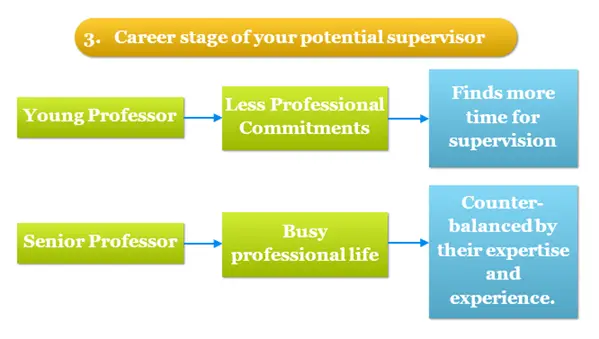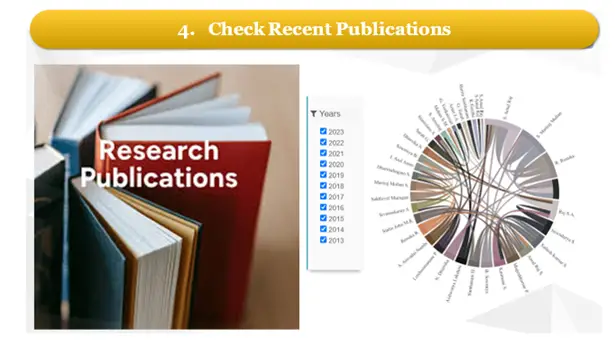PhD supervisor is the most powerful person in any PhD scholar’s academic career. From the beginning of the research to the end, a good supervisor plays different roles like mentor, advisor, and cheerleader. A scholar gains confidence in research only through his/her supervisor. Therefore, it’s important to make a wise choice in choosing a supervisor for the successful completion of your PhD program. In this article, iLovePhD listed the nine key factors when you choosing a PhD supervisor.
“A good teacher knows how to bring out the best in a student!!”
Charles Kuralt
Selecting a PhD supervisor is one of the most crucial and difficult decisions for a young researcher to make. Your decision will be influenced by the subject area you wish to carry out your work. Remember, when you are pursuing your research, there will be extreme highs and extreme lows throughout your PhD, so you should try to choose a supervisor with whom you can collaborate effectively during challenging circumstances.
How will you choose your PhD supervisor depends on whether you’re applying for an R&D-funded project or putting forward your research proposal.
9 Key Factors to Choose a PhD Supervisor / Guide / Advisor
1. R&D Funded Project or Own Research Proposal
- If you’re applying for an R&D-funded project, the process of choosing a supervisor is simple.
- Usually, they will be the principal investigator of the project, you can join as a JRF ie., Junior Research Fellow in the project to do the project work, and at the same time you can use this data to get your PhD degree, provided the principal investigator of the project and your research supervisor should be the same.
- The advantages of working in the funded project are that you will get the complete roadmap of your work at the initial stage of your PhD and you will get the fellowship during the project period.
- On the other hand, if you’re proposing your research proposal, you have to do some groundwork to choose a supervisor whose research interests align with your interests.
- You have to be clear in your area of research and should have a rough idea of what you want your PhD topic to be.
- In this way, you can narrow down the potential supervisors by research interests and then focus on those who have expertise in your area of research.
2. Check Scientific Databases
It will give you lots of data with which you can refine your search.
- This allows you to look for the most cited articles and thus helps you to choose who the leading researchers are.

3. Career stage of your potential supervisor
- Then look for the career stage of your supervisor.
- A professor at the beginning of their career might have fewer professional commitments and therefore they find more time to supervise you.
- A senior professor may have a busy professional life – but this could be counter-balanced by their expertise and experience.

4. Check Recent Publications
Let us assume that you have short-listed 10 professors, now you need to check for their publications and give more importance to their recent publications so that you will get to know about the current research works going on under their supervision.

5. Prior Meeting
Once you’ve done your search for a supervisor and have a clear idea of your proposed research topic, you should make a shortlist of around three potential supervisors to contact.
Make sure that you understand their academic background and current projects so that you can make an excellent first impression when you get in touch with them.
6. During the meeting
If you’re able to meet your potential supervisor and discuss your research proposal, you need to have a good research plan of what you want to achieve with your PhD research.
Meeting them in person is a great way of gauging their personality and your chemistry.
You are going to work with them for a minimum of three years, so you can make sure you are going to get on with them.
Also, it’s good to know the other details like If they’re planning to retire or change institution, because that could affect your research later down the line.
You should have a supervisor who is going to stick around for the duration of your PhD.

7. Status of Current PhD Scholars
- Find out what sort of research work the supervisor is currently involved in.
- You can normally see a list of current research scholars on the department website.
- You can get feedback from them regarding the supervisor’s methodology of guidance.
8. Research Facilities and Funding
- Check for research facilities available in the department or Centre.
- Make sure that the laboratories are equipped with the state-of-the-art instrumentation and equipment facilities needed to carry out your research.
- Check whether the institution or the department has a well-established library facility to access reputed and peer-reviewed publications and e-journals.
- Check for any fellowships available in the department/University for PhD research.
9. Collaboration
- Depending on your preferences, you can decide whether you want to work within a small, specialized department or a larger team that allows more scope for interdisciplinary collaboration.
Some of you may want to carry out PhD program under the part-time category. In this case, you need to get NOC ie., a No Objection Certificate from the organization where you work. If your organization permits you, you can register your PhD in the University you want to do. You may have to choose a co-supervisor or a joint supervisor. And he/she may be your head of the organization. Also, ensure that your organization is registered as a research center under that University. Otherwise, they need to sign a MoU. These procedures depend on the University guidelines and it may vary from one University to another. So, you need to be aware of all these details too.
Conclusion
Now that you know how to choose a good supervisor for your PhD. You will be spending a lot of time with them during your PhD, so it pays to understand what to look for in-terms of personality traits, expertise, and experience. There are many supervisors out there, and it is always feasible to choose supervisor with whom you can work well and produce a good research. Ultimately, you need to get your PhD degree. So, it’s a decision that should be taken very seriously.
Happy Researching!
Bonus: Secret Tips in Choosing a PhD supervisor?
iLovePhD has stated some of the secret tips for choosing a good supervisor to do PhD:
- PhD supervisor should be an expert in your area of research. Check for the supervisor’s recent publications.
- Prepare a project proposal or some specific research ideas clearly before contacting your supervisor.
- Talk with the experts about your research interest in person before finalizing the one who is going to supervise you.
- Talk with the scholars who are working currently under the professor/expert.
- Check the research facilities (Library, Instrumentation, access to journals) available in the department.
- Also, check for fellowships/scholarships available in the department/University. Check for R&D project with supervisor to carry out Ph.D. with fellowship.
- Talk to other students who have already worked with the potential supervisor to get an honest review of their experience.
- Look for supervisors with an active research program that interests you.
- Consider the supervisor’s availability and how accessible they will be for guidance and support.
- Look for someone with the knowledge and experience relevant to your intended research field.
- Explore whether the supervisor has funding for new projects, as this may impact your ability to conduct research.
- Ask yourself if you think the supervisor is someone you can connect with and can trust.
- Find out if the supervisor is willing and able to attend conferences and workshops, as this could provide networking opportunities.
- Ask if the supervisor’s institution offers resources that may be beneficial to your research and development, such as a library, laboratories, or computing facilities.
- Make sure to understand the requirements of the supervisory team, and if applicable, any co-supervisors, before accepting an appointment.
- Learn about the expectations and requirements of the supervisor so that you can determine if you are comfortable working with them.
In conclusion, a PhD is not just a degree, it’s a process of understanding your research area. Therefore, it’s a scholar’s responsibility to choose a good supervisor for their research career.
All The Best!

Follow us on Pinterest: iLovePhD
Also, Read
Top 38 Possible PhD Viva Questions
How to Become an Academic Journal Reviewer?|Step by Step Guide



[…] How to Choose a PhD Supervisor? […]